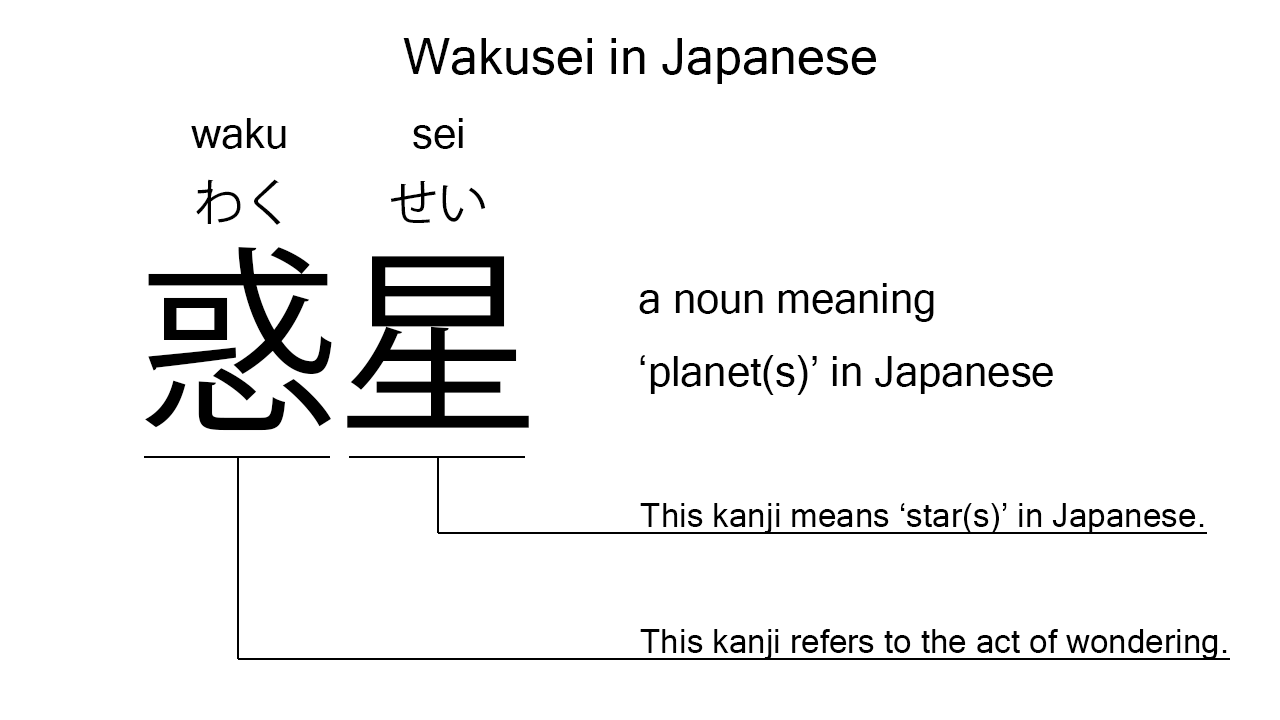What does “wakusei” mean in Japanese?
Native speakers say “wakusei” to mean ‘planet’ in Japanese. Perhaps, some Japanese learners know this word as it is sometimes used in Japanese movies, songs, novels, manga, anime, and the like. In this blog post, however, I will explain this word in detail based on its kanji expression. And also, I will explain how to use it through example sentences. My explanations would help Japanese learners understand “wakusei” more clearly. Then, let’s get started!
Contents
Definition and meaning of “wakusei”
Let me start with the definition and meaning of “wakusei”.
- wakusei – 惑星 (わくせい) : a noun meaning ‘planet’ in Japanese. This can also work as plural. Learn more about Japanese plural.
The definition and meaning are simple and clear. To understand this noun more clearly, however, let me explain its kanji characters in detail, one by one.
Wakusei in kanji
The kanji expression of “wakusei” consists of the following two kanji characters:
- 惑 : a kanji character used to refer to the act of wondering.
- 星 : a kanji character used to mean ‘star’ in Japanese.
These two kanji characters tell us that “wakusei” literally means a ‘wondering star’ in Japanese. This literal interpretation is not completely in line with the actual meaning, but still understandable, I think. People in the past thought that planets were objects which were floating in the sky and wondering where to go.

When we meet new kanji expressions, we should check their kanji characters in detail to understand their meanings clearly and deeply. In many cases, kanji characters tell us a lot about the meanings of the expressions they form. Actually, here, we could get the better understanding of “wakusei” through the detailed kanji check above.
So far, I’ve explained the definition and meaning of “wakusei” together with its kanji characters. Then, let me explain how to use it through the example sentences below.
Example #1: how to say “planet” in Japanese
boku wa kono wakusei wo mamori tai – 僕はこの惑星を守りたい (ぼくはこのわくせいをまもりたい)
I want to save this planet.
Below are the new words used in the example sentence.
- boku – 僕 (ぼく) : a pronoun meaning ‘I’ in Japanese. This is used mainly by boys and young males.
- wa – は : a binding particle working as a case marker or topic marker. In the example, this works after “boku” to make the subject in the sentence.
- kono – この : a determiner used before a noun which refers to something close to the speaker. In the example, this is used before “wakusei” to say “this planet” in Japanese.
- wo – を : a case particle used to make the object word in a sentence. In the example, this is used after “kono wakusei” to make the object in the sentence.
- mamori – 守り (まもり) : one conjugation of the verb, “mamoru“, which means ‘to save’ or such in Japanese. In the example, it has been conjugated for the better connection with its following word.
- tai – たい : an auxiliary verb used after a verb to make its desire form. In the example, this is used after “mamori” to make its desire form, “mamori tai”, which means ‘to want to save’ in Japanese.
This is a typical usage of “wakusei”. In this example, it works together with the determiner, “kono”, to mean ‘this planet’ in Japanese.
Example #2: another usage of “wakusei”
wakusei wa hikara nai – 惑星は光らない (わくせいはひからない)
Planets don’t shine.
Below are the new words used in the example sentence.
- hikara – 光ら (ひから) : one conjugation of the verb, “hikaru”, which means ‘to shine’ in Japanese. In the example, it has been conjugated for the better connection with its following word.
- nai – ない : an auxiliary verb used after a verb, adjective, or auxiliary verb to deny its meaning. Word orders in Japanese and English are different, but the role of this auxiliary verb is similar to that of “not”. In the example, this is used after “hikara” to deny its meaning.
This is another typical usage of “wakusei”. In this example, it works as a plural to mean ‘planets’ in Japanese. When we want to refer to a planet or planets in Japanese, this noun is always a very good option.
Summary
In this blog post, I’ve explained the definition and meaning of “wakusei” in detail based on its kanji expression. And also, I’ve explained how to use it through the example sentences. Let me summarize them as follows.
- wakusei – 惑星 (わくせい) : a noun meaning ‘planet’ in Japanese. This can also work as plural. These two kanji characters literally mean a ‘wondering star’ in Japanese. This literal interpretation is not completely in line with the actual meaning, but still understandable, I think. People in the past thought that planets were objects which were floating in the sky and wondering where to go.
Hope my explanations are understandable and helpful for Japanese learners.